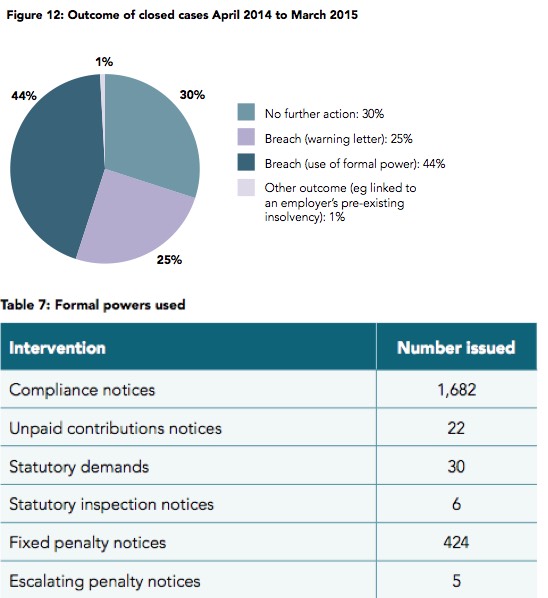Fines worth just under £170,000 were handed out to firms for auto-enrolment failings in the 12 months from April 2014.
The Pensions Regulator has published an annual summary, up to March, showing that it used formal non-compliance powers on 2,169 occasions.
Officials issued 1,682 compliance notices and 424 fixed penalty notices – fines of £400. This made the total fines worth £169,600, though 5 escalating penalty notices were also issued. The body does not publish how much these amounted to.
As with fines issued by the FCA, the money goes to the Treasury.

During 2014-15, the regulator closed 2,082 cases. In 30% of these, no further actions were required following initial contact, in 25% it issued a breach warning letter to the employer, and in 44% it was deemed necessary to use formal powers, such as issuing compliance notices, unpaid contributions notices and statutory inspection notices.
The regulator’s report stated: “As the number of employers staging rises significantly, we expect to see an increase in how often we need to use our statutory powers.
“This expectation is based on our research among small and micro employers, which shows that these employers are more likely to leave automatic enrolment preparations until closer to their staging date, or indeed until after their staging date, and therefore risk being non-compliant with their duties.
“We also expect some will fail to engage with their duties and it will take a nudge from us through a compliance notice or fixed penalty notice to encourage them to act.”
{desktop}{/desktop}{mobile}{/mobile}
Employers should prepare early, officials said, as they warned that “we will take action against those who fail to carry out their automatic enrolment duties in respect of their workers”.
In the year ending March 2015 the body used its formal powers on 2,169 occasions.
Employers who receive a statutory notice have the option to ask for a review. Over 500 employers have asked for a review to date, and in the majority of cases it has revoked a notice issued, as the vast majority of applicants no longer employ any workers due to their circumstances changing.

